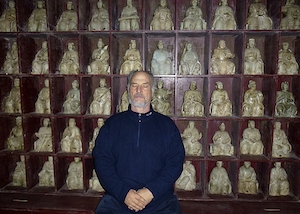Taoist Sexual Meditation: Connecting Love, Qi and Spirit
The Invitation
I was a nineteen-year-old hotshot martial arts champion. It was the 1960s, and I had managed to get myself introduced to the legendary tai chi, hsing-i and bagua master, Wang Shu Jin. Amazingly, he was willing to take me on as a student. On a hot and humid afternoon, we were sitting together in his living room in Taichung, Taiwan. Bald-headed, big-bellied, with arms and legs like tree-trunks, the old man proceeded to lay into me. “I can fight better than you. I can eat more than you,” and then hitting me way below the belt, at least metaphorically speaking, he added, “and I’m better at sex than you. There’s more to being strong than youth. It’s all to do with how much qi you have.”
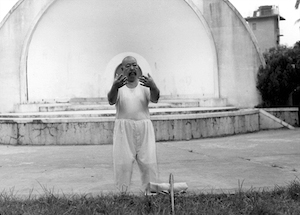
Sometime later, in the middle of sparring practice, Wang took the idea further: “You look like a sexually high-spirited young man,” he told me, “but do you really know how to do it?” I was shocked and insulted and didn’t like where the conversation was going. Here was a man in his sixties, carrying 300 pounds on a 5 foot 8 inch rotund frame—not the body type you might commonly associate with the buff, macho sexuality paraded about in the West. Who was he to challenge my youthful enthusiasm and what I thought of as natural prowess?
In fact, I knew full well who he was—one of the best fighters in all of China. When I realized that his intent was not to insult me but to open my mind, I began to get curious about what he might know. I’d already experienced the remarkable power of Master Wang’s qi firsthand—when he had first invited me to spar with him. Even with black belts in judo, karate, jujitsu and aikido, I couldn’t get near him. When he asked me to punch him in the gut as hard as I could, he bounced me right off his big belly like a rubber ball. As a martial artist, he was matchless. That much was abundantly clear. Equally remarkable were his older students, some in their sixties or seventies, including women, who could spar with me and hold their own. Without a doubt, Wang was an extraordinary teacher.
Wang told me that there was a secret Taoist meditation group with a comprehensive knowledge of sex, far beyond what I could imagine. He invited me to join it. For a total of seven years, I trained intensively with this group to which Wang had given me an introduction. Later I completed my studies of Taoist meditation in Beijing, under the tutelage of Taoist Lineage Master Liu Hung Chieh.
Sex and Taoism – A Match Made in Heaven
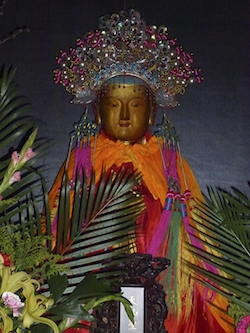
The Taoists see sexuality as essential to who and what we are—an aspect of our nature that can be cultivated, rather than repressed or denied. Instead of attempting to conquer our “lower nature” and suppress what are essentially healthy impulses, Taoists encourage living life in harmony with what is.
Sexual energy is the single most powerful, natural internal force that is readily available to a human being to foster his or her spiritual development. For thousands of years, Taoists have harnessed this qi using precise and very pragmatic methods.
The sexual act itself causes your qi to naturally become vibrantly obvious and accessible to you.
For most of us, the word “meditation” conjures up a person sitting on a cushion in an upright posture with eyes closed, quietly communing with a higher power. We don’t generally associate meditation with making love. Yet the Taoists found combining sex and meditation with specific methods to be one of the fastest methods to accelerate a practitioner’s spiritual advancement.
Learning Taoist sexual practices is a multilevel process. The beginning level could be called “ordinary sex” or “the way of love.” The intermediate level, or “subtle energy sex,” is what Taoists refer to as “sexual qigong” or “the way of energy.” The advanced level is “sexual meditation” or “the way of spirit,” an accelerated path to full enlightenment.
Ordinary Sex
Ordinary sex is about having more pleasure, emotional satisfaction and peace during lovemaking and in the course of your everyday life. The foundation for this level is learning how to navigate, activate and turn on all the body’s erogenous zones to best effect, utilizing every part of your body that can accomplish the task.
Ordinary sex eases the hormonal system and releases internal pressure. It can help train relaxation and release the nerves so that sex can become enjoyable. Feeling frustrated and irritable after a long workday? Having sex can be a great antidote. Along with the feel-good experience that makes both people happy, sex regulates the natural sexual urge that if left unfulfilled can make a person edgy and irritable.
Sexual activity helps to regulate the flow of bodily fluids, improve mood and balance hormones.
Sadly, many couples don’t even have an ordinary sex life. Nerve tiredness—a common experience in our overwhelmed, overscheduled, fear-driven, technology-dependent lives—causes lack of interest and an inability to have sex.
Nervous exhaustion diminishes the sex drive by dulling the central nervous system in general and the sexual nerves in particular, rendering them incapable of feeling and responding.
This is why people say “my nerves are shot” after a day of excessive visual and other stimulation. The nerves actually get temporarily burnt out when your mind and emotions are racing faster than your nerves can handle. At the very least, ordinary sex practices can help resolve many of the avoidable tensions that get in the way of enjoying sex.
Over thousands of years, Taoists have developed and honed precise and very practical methods to relax and release the nerves.
Relaxation helps a man prolong the sex act, maintain erections longer, and climax without ejaculating. It can enable a woman to achieve orgasm more easily or become multi-orgasmic, and she can learn to expand her orgasm so that it ripples in waves through her entire body. The two simple practices that follow can help partners relax and restore tired nerves. The practice of pulsing[1] is especially helpful.
The following ordinary sex practices can help you begin to achieve relaxation during sex that you can carry into other aspects of your life.
Practice 1: Merge Your Breathing
The simplest way to rejuvenate tired nerves is for you and your partner to breathe together, breathing just loudly enough to hear one another. Simply hold each other in a comfortable position and continue until your breaths gradually begin to synchronize. Slowly allow each breath to become deeper and quieter, until both of you grow very quiet inside and breathe as one person. This is a wonderfully simple way to create connection, deepen emotional bonding and reawaken sexual desire.
Practice 2: Pulsing
Another way partners can calm their nerves when exhausted is by holding and gently pulsing each other’s hands, which involves gently opening and closing the hand and wrist joint in a smooth rhythm. Begin with light squeezes and then gradually add more intensity as your sexual contractions begin to awaken. Eventually, you will be pulsing together in unison. Keep the pulsing synchronized while you and your lover’s minds and nervous systems slow down and begin to relax.
Partner Breathing and Handholding Practice
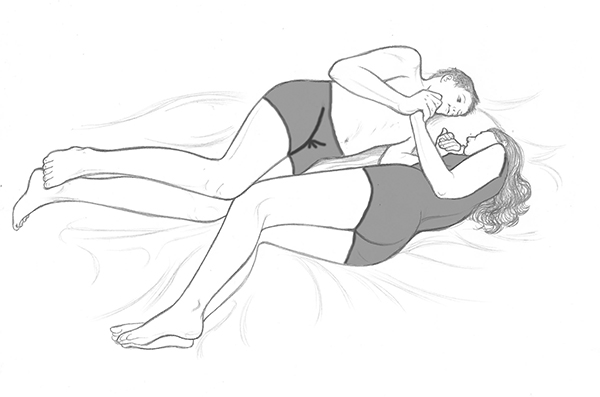
You can also use both of these methods simultaneously so that you breathe and pulse hands in unison. Eventually, you and your partner will become quiet and calm, aware of the simple pleasure you are generating in each other’s bodies. Let nervous exhaustion fade away as you both relax into and feel the interplay of each other’s yin and yang energy.
Pulsing is the body’s basic condition during lovemaking. Pulsation occurs naturally in your genitals during pleasurable writhing and sexual contractions. The pulsing exercise helps you along the path to relaxation.
The basic question is, “Can you relax your nerves sufficiently so that you and your partner can pulse together during sex?”
Commonly, one partner is so exhausted that he or she simply closes down and becomes numb. A verbal or nonverbal signal says “No thank you” to sex and that’s where it ends. Instead, try to breathe and pulse in unison to develop mutual relaxation. Sexual rapport is often a direct result.
Allow your partner the time he or she needs to release nervous exhaustion. After a few minutes of pulsing, as accumulated nervous system tension releases, your partner might just be in the mood. If he or she falls asleep, or really wants to crawl into a cocoon, simply allow it. When he or she wakes up, the deep state of relaxation that your pulsing has induced often leads to sexual interest.
Sexual Qigong

Sexual qigong goes beyond ordinary sex by working directly with the qi that flows through a human being. This level works with deeper energetic physical, emotional, mental, and psychological dimensions and, potentially, the psychic energy realm.
Through consciously engaging, activating and directing the flow of subtle energy within and between sexual partners, sexual qigong can have extraordinary significance and value. With practice you can shift from being under the influence of your feelings—identified with whatever is blasting through your body and mind at the moment—to actually becoming like the conductor of an orchestra. Once you learn to work with energy, balancing and harmonizing it, you can bring suppressed emotions to the surface, or tone down emotions that tend to flare up and wreak havoc. In addition to helping you become emotionally healthier, sexual qigong energizes your mental and creative processes.
In the Eastern traditions that harness subtle energies in a sexual context, the price of admission is often some form of training in such energetic practices as Indian or Taoist yoga, qigong, or the push hands practices of tai chi. These body-mind methods train you to access your inner self and become sensitive to where energy flows smoothly and where it feels stagnant.
The Practice of Dissolving
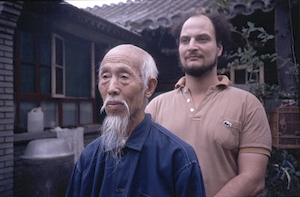
Inner and Outer Dissolving[2] are at the heart of the Taoist Water tradition, described by Laozi (Lao Tzu) in his book, the Dao De Jing (Tao Te Ching), written more than 2,500 years ago. I am a lineage holder in this tradition through Liu Hung Chieh of Beijing.
Within sexual qigong, Outer Dissolving activates and opens up the body’s energetic anatomy and qi pathways. It can also be used to bring out greater physical abilities, for example to help an athlete perform better in competition or give a mountain climber more stamina.
The Outer Dissolving practice of sexual qigong is used to mitigate or heal illness as well as to release the energetic blockages that diminish one’s capacity to experience sexual pleasure.
As you advance, you learn the Taoist sexual meditation method of Inner Dissolving to let go of the deepest energetic blockages. The goal of Inner Dissolving is to release and resolve deeper energetic blockages of one or ideally both sexual partners so that the practitioners can evolve spiritually all the way to enlightenment.
A practitioner moves through the following three stages within the Taoist Water tradition Dissolving practice:
(1) Sexual qigong techniques based on Outer Dissolving.
(2) Sexual meditation techniques based on Inner Dissolving.
(3) Synthesis of Inner and Outer Dissolving, taking Dissolving to its higher potential in order to transcend the limitations of being corporeal.
Sexual Meditation
Sexual qigong is the bridge to Taoist sexual meditation, a sophisticated method of channeling subtle energy for spiritual purposes. There is a world of difference between what is often called sacred sex and sexual meditation. Many people think that running subtle energy through the body is meditation. It isn’t. Running energy is running energy. When people begin to perceive energy, sex becomes incredibly alive and far more satisfying—however this is the purview of sexual qigong rather than meditation.
Sexual meditation is also not related to the spiritualization of sex that comes with creating a sacred container, building an altar or performing a puja (the ceremonial invocation of the god and goddess within that is part of Indian Tantra). All of those practices have their appropriate place. Sexual meditation is of another order altogether.
Through sexual meditation, the Taoists discovered that you can gain access to up to four times the normal energy available for use within meditation practices to dissolve spiritual blockages.
With sexual meditation you can begin to use the more advanced method of Inner Dissolving to:
Consciously both enter and merge with your partner’s consciousness and have your partner do likewise with yours.
Consciously dissolve the deeper energetic blockages of both you and your lover and have your partner simultaneously do the same.
Go beyond the limitations of corporeal form.
In the Taoist world, sexual meditation is first and foremost a vehicle for spiritual development and practice. The goal is to work toward what is commonly called enlightenment. It is considered a direct and even accelerated path that enables lovers to start engaging with spirituality by harnessing sexual energy, a naturally powerful energy readily available to us as human beings.
Sexual meditation methods go well beyond what can be attained using sexual qigong. While making love, these practices enable you to refine and increase your ability to release the deepest blockages that prevent the full flowering and emergence of your soul. Sex becomes a means to open a direct path to uncovering the possibilities of spirit and releasing your full human potential.
Eight Taoist Principles
Although Taoism is one of the great religions of the world, it is not widely understood by Westerners. Many have been introduced to Taoism through three ancient literary works—the I Ching, the Tao Te Ching (written by Laozi) and the Book of Zhuangzi, which have been translated and analyzed by scholars and studied in academic circles.
At its core, the essence of Taoism is about pragmatic practices that make it possible to live well in the world.
Taoism is very much about how to make something work rather than how to think about a subject or analyze it. What are the steps to becoming vibrantly healthy? How do you best work out emotional issues that have plagued you since childhood? How do you become a better and more sensitive lover? How do you train to become a more effective fighter? What is the best way to deal with fear or change?
All religions have spiritual beliefs, but most do not have health, fighting and sexual arts as part of their religious canon. Taoism is unusual in that it does. Nor do many religions have a living sexual meditation tradition that guides you step-by-step on the path of spiritual awakening.
The Water method of Taoism was passed down through Laozi. The following eight principles are fundamental to Laozi’s tradition of sexual qigong and meditation and lie at the core of the Water method.
Naturalness
Nature—zi ran in Chinese—is another way of saying the Tao. It is tempting to frame sex as something that is either sacred or profane. To Taoists, sex may be either, neither or both. In fact, from the viewpoint of spiritual evolution, neither an abundance of sexual need and desire nor a complete lack of it is relevant. Sex is a natural part of human nature.
Naturalness is the goal.
With regard to sexuality, this means being natural, comfortable and at ease in all phases of sexuality. Let the flow be natural from the initial meeting to foreplay and orgasm. Neither attempt nor engage in games to manipulate the other. Leave aside cookbook approaches and do what comes naturally from the qi that spontaneously arises in both partners.
Internal Balance
The cornerstone of sexuality is the ability to attain internal balance—something often desperately sought in today’s frenetic world. Internal balance is an essential component to living a satisfying life. Sex should make both people feel smooth inside, both in the midst of sexual play and even more importantly, for a long, lingering period afterward. Developing internal balance is the key to being able to have longer and more stable relationships. An erratic jangled afterglow diminishes the possibility of both partners being willing to try to stay bonded either as platonic friends or lovers.
Relaxation
The entire Water tradition emphasizes relaxation at all levels of human experience. Beyond relaxing your muscles and nerves, its methods help you relax into the deepest substructures of your anatomy. Energetically it deliberately teaches you to relax your qi, the energy that enables your physical body, emotions, thoughts and hidden psychic capacities to function smoothly. The more relaxed you are on all levels from the physical to the psychic, the better the sex you can have. Relax ever more deeply as foreplay continues. Let the ever-increasing relaxation of sexual, emotional or mental foreplay lead you gradually into intercourse. If only one lover is a sexual qigong or sexual meditation practitioner, it still makes sex significantly better. If both are practitioners this makes sex for both partners more satisfying and spiritually fruitful.
Making Your Body Conscious
The Taoist tradition is one of the few that truly brings people fully into their body. Practices like Taoist breathing, qigong and tai chi are meant to strengthen the human nervous system and prepare the body for higher spiritual work. Taoist practices teach you how to focus your full attention on the inside of your body until it wakes up and feels alive, not as an imagined visualization, but as a felt reality. The practices teach you to think less and feel more.
The methods derived from the Water tradition of Laozi to develop internal feelings concentrate on allowing, following and working with the energies that already exist in your body at each instant of time.
Seventy-Percent Rule: Do Neither Too Much Nor Too Little
All Taoist qi practices from the original Water tradition incorporate the principle of moderation that can be described as the “seventy-percent rule.” The rule states that you should only do a practice or technique to seventy percent of your capacity. Striving for one hundred percent produces excess tension and stress that causes the body to tense up or shut down. In this era, people are led to believe that by straining, they will progress faster and further. Most people do not want moderation—they want excess. However, if you always push your energy to a hundred percent, you will never allow your nerves and muscles to relax so that you can progress efficiently without producing unnecessary stress or burnout.
The seventy-percent rule and relaxation are fundamentally linked.
This is especially true when sexual practices are involved because they create a high energetic output that can result in a large amount of internal resistance within one or both partners.
Letting Go
Your spiritual progress could be likened to the way a great statue can emerge from a huge piece of marble. Through the application of control, the artist creates a vision of what he or she wants it to look like in the end. The artist draws up clear plans with all desired specifications according to his vision. Next the plans are precisely executed where each detail is controlled perfectly and from this you get a statue. This is way of the Fire method of Neo-Taoism that was developed after the Water method. A major aspect of the Fire tradition is control.
Through the application of letting go, the artist places the big piece of marble in the studio, looks at it and observes while letting go of any idea of what the rock should become. The artist waits and merges his energy field with the rock’s energy field. The rock then tells the artist what has to be let go and chiseled away. The statue thus emerges from the nature of the combined energy of the rock and the artist. The artist is the agent through which the flow of manifestation moves. This is the way of Water, flowing through all the practices in Laozi’s lineage.
Inner and Outer Dissolving are the primary methods by which letting go is accomplished. You recognize what is tense or dysfunctional inside and then let it go.
Wu So Hui and You So Hui
Two phrases lie at the core of how Taoists decide to implement any moral or philosophical principle in life. Wu so hui means “the small stuff”; “it’s neither here nor there”; “it’s okay if you do or don’t.” Often these are the thousands of small decisions a person makes each day. You so hui considers what is critically important, essential to living. This is the big stuff that really matters.
On the level of ordinary sex between consenting adults, the choices generally can be called wu so hui. From the Taoist spiritual perspective generally, that which positively or negatively affects the events of your life on this earth, but will not create karma nor follow and potentially control you in future lives, is spiritually wu so hui. This is important to address with care, but not critical.
When something is deeply gnawing your guts, has repetitively gotten in the way of health, emotional or sexual relationships, it’s you so hui. If it can damage you and negatively condition your spirit not only in this life but potentially afterward, then it’s you so hui.
Whatever your culture or religion, looking at your choices in life from the perspective of these two phrases is an interesting and practical method for consciously examining them, particularly in terms of sexuality. It’s another tool for accessing your awareness.
When the False Leaves, Only the True Remains
As you make your body more conscious, you become more able to see what is inside. This brings us to the principle of “When the False Leaves, Only the True Remains.” Once you start to see what is inside yourself and apply dissolving practices, then, as your blockages resolve, you let go of layer after layer of falsehoods until eventually you will be left only with what is true.
Dissolving blockages will enable you to let go all these falsehoods. Without the layers of dust, clouds and that which is false, it becomes much easier to see what is true in all times and places. By ridding yourself of all that is false, you will arrive at your true nature and the Tao. Likewise, if you arrive at your nature there can be nothing that is false.
These eight principles have no hierarchy. All Taoist practices and principles each flow into the other. Like life itself, each principle or qi practice in Taoism should seamlessly integrate with the others.
The Superior Man or Woman
The I Ching (Book of Changes) refers to the superior man or woman, and it also mentions the inferior man or woman. Almost everything that transpires in conventional society stems from the mindset of the inferior man or woman. All the craziness of politics and corruption are nothing more than the actions of the inferior man or woman. The majority of people in the world simply don’t have access to the subtle dimension of their soul. They remain impoverished of spirit, even though their insides contain immense untapped wealth. It’s as if they have a million dollars in the bank, but don’t have the access code to get cash from the ATM machine.
If you want to become a superior man or woman, you have to get rid of the blockages—the obstacles that prevent your conscious mind from recognizing what the rest of you truly is. If you don’t recognize who and what you are—if you don’t “gain your soul,” as Gnostic Christians would say—you are left to fixate, moment by moment and time after time, on whatever piece of you appears to be a big deal.
The distraction, upset or fascination of the moment becomes your whole world. There are trillions and trillions of fixations that you could make important, but none of this will make you smooth inside. Nothing you gain on the outside leads to freedom from all that nonsense, it just perpetuates your fixations. The base of what drives you remains.
Getting rid of what drives you and resolving it—freeing that energy—is what sexual meditation and, in fact, all Taoist meditation is about.
Taoist meditation leads you on the path to becoming the superior man or woman of the I Ching. It allows you to become extraordinary, to go beyond what Buddhists refer to as “obstacles,” Indian yogis call “samskara” and the Taoists call “blockages.” These are blocked impressions, the energies within your being that prevent your conscious mind from recognizing what you truly are. Meditation takes you to the root of what’s in your mind. It allows you to recognize what drives you and get rid of it. You want to release that energy so it can be free to do what it’s supposed to do rather than remain stuck and churning inside, causing no end of upset, tension and unresolved expectations.
Highly refined practice methods enable you to arrive at a state of freedom, which is the whole purpose of meditation. In Christian terms, the aim is to literally know God’s mind. In Taoist meditation, it’s to gain your being, to be inside the mind of the universe. It is in order to attain this ultimate realization that the wide spectrum of spiritual practices using qi work originally came into existence.
Once you have become familiar with the reality of your mind and spirit by traveling inside yourself and gaining your soul, sooner or later the time will come when you realize you are at the next stage. This requires that each individual engage with the world, explore how the world and the soul are connected and how each can fulfill or block each other. This is the mutually reinforcing circle of life that carries us through many stages of spiritual evolution.
Little known and rarely taught, Taoist sexual practices offer a wonderful way to experience spirituality. However, more satisfying and fulfilling lovemaking is just a tiny fraction of what Taoism can give you. It is my hope that one of the world’s great religious traditions becomes more fully understood in the West, so that its potent, transformative techniques can be used to benefit the human condition in all kinds of ways, from the everyday to the esoteric, both inside and outside the bedroom.
This article is excerpted from Bruce Frantzis’ forthcoming book, Taoist Sexual Meditation: Connecting Love, Energy and Spirit.
Bruce Frantzis, Ph.D., spent more than a decade following the Taoist path of warrior/healer/priest in China, where he was trained by some of its greatest masters. He is the first known Westerner to hold authentic lineages in Taoist meditation, qigong, tai chi, bagua and hsing-i. Frantzis studied in Japan and India for five years and has extensive experience in Zen, Tibetan Buddhism, yoga, Kundalini, energy healing therapies and Taoist Fire and Water traditions. Visit www.EnergyArts.com for Frantzis’ worldwide calendar of events and complete listings of his books, CDs, DVDs and certified instructors.
Author: Bruce Frantzis
Images: Caroline & Bruce Frantzis
[1] Pulsing, also known as opening and closing, is a key component of Taoist neigong. The author teaches pulsing techniques within his Marriage of Heaven and Earth™ Qigong program.
[2] For more on Outer Dissolving, see the author’s qigong book, Opening the Energy Gates of Your Body, (North Atlantic Books, 2006), Chapters 6–8. Inner Dissolving practices are described in detail in the author’s book, The Tao of Letting Go, (North Atlantic Books, 2009) and accompanying CD set.


